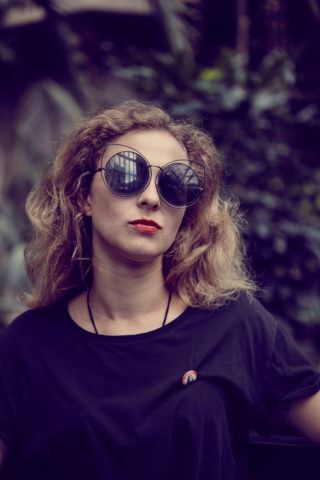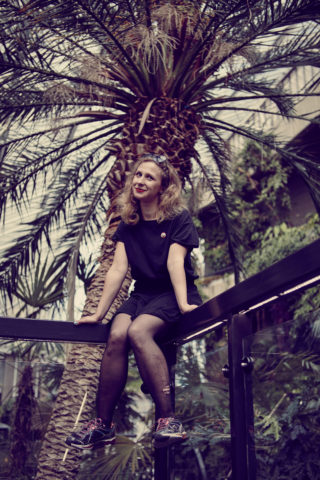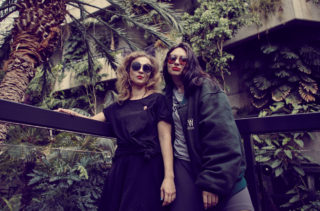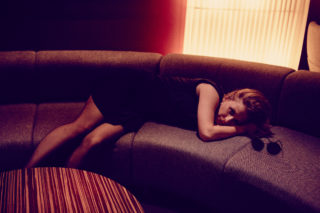Pussy Riot’s Maria Alyokhina – never scared into silence
The Russian activist on the art of protest, the influence of Riot Grrrl and her famous, unjust prison sentence

The Russian activist on the art of protest, the influence of Riot Grrrl and her famous, unjust prison sentence
I’ve been writing about music for a while now, and I’ve met all sorts doing this job. From budding pop stars to rustic folk musicians, if there’s one thing that continues to amaze me that connects most of the people I talk to together, it’s a sense of commitment. Contrary to the popular belief, musicians and artists aren’t a feckless bunch. It takes a lot of drive to do what they do and almost everyone I encounter has this ‘we’re going to do this, come hell or high water’ attitude.
Maria Alyokhina has taken this approach to a whole different level. Although she doesn’t immediately look the part as she quietly munches her way through a salad in the Barbican Kitchen, she is one of the most driven people I’ve ever had the pleasure of talking to. A founding member of Pussy Riot, the Moscow based protest art collective that the world has heard about by now, she is a leading voice in the fight for LGBT rights, Women’s rights and opposition to Putin’s government using guerrilla performances and unplanned acts of defiance.
In 2012, one of these spontaneous, unauthorized performances inside Moscow’s Cathedral of Christ the Saviour led to the group being at the centre of an international incident. Held in the midst of the ‘Snow Revolution’ against electoral fraud in Russia, the six members smuggled a guitar into the church, donned dresses and balaclavas and climbed onto a platform next to the altar to jump around and punch the air. The plan was to use this footage as part of a video called ‘Punk Prayer: Mother of God Drive Putin Away’: a montage-like blending of punk attitude and spiritual music that called for the Virgin Mary to become a feminist.
You had to have been living under a rock to miss what happened next. Following the concert, Aloykhina and her fellow group members Nadezhda Tolokonnikova and Yekaterina Samutsevic were arrested, charged and convicted of ‘hooliganism motivated by religious hatred’ and sentenced to two years in Russia’s notoriously brutal penal system. The trial attracted international condemnation with human rights groups like Amnesty International calling the women ‘prisoners of conscience’. Despite the pressure, the sentences against two of the women were upheld. Tolokonnikova and Alyokhina both served over a year in jail, eventually having their sentences reprieved by the Russian State Duma in December 2013.
If you think this experience, which included hunger strikes and periods of solitary confinement, has softened Aloykhina’s passion and feminist agenda, you’d be wrong. The period between 2014 and 2016 saw multiple Pussy Riot performances and actions. Alyokhina has appeared as a speaker at many international festivals, conferences and events. She has also retold the story of her protest, arrest and incarceration in a new book (published earlier this month by Allen Lane) and live performance called Riot Days.
Following a successful tour of the US and two controversial Russian performances, The Barbican will be presenting Riot Days’ first UK performance at the Islington Assembly Hall on the 17th of November. Directed by leading Russian Theatre director Yury Muravitsky, and featuring Alyokhina, actor Kiryl Masheka, and Nastya and Max of the music duo AWOTT (Asian Women on The Telephone), this hybrid of spoken word, re-enactment, video and experimental punk conveys the story in a way that is both political and deeply personal.


And although I’d never call myself a musician, music has always been an important part of my life. My favourite bands have always been Russian punk bands like Grazhdanskaya Oborona and Avtomaticheskie Udovletvoriteli. Not only because they made great music, but also because they made incredible protest poetry. That’s how our country fought back against the repression of the Soviet Union. The ’80s really showed how you could fight a system with music and cinema and show people that they have a voice and can make some big changes.
That’s how film became a big part of my life. When I was 15, the only place you could really buy music was an underground market that sold pirate CDs. I didn’t seem to ever have enough money, though, so I got a job in a video rental shop. In the end, I didn’t ever make much money, but I did have access to all the films I could ever watch, and that’s how I fell in love with cinema. There were films from Tarantino, Stanley Kubrick, and all these European art house movies; they were all available in that shop.
In a way, that pirate market played a big part in the creation of Pussy Riot. On the one hand, it’s not really that unique a story and I don’t feel like I should be making that big a deal about it, but on the other, this little market did start something that has gone out across the world.
Both the music in general and the bands have been a huge influence. We don’t really have many feminist bands or collectives in Russia. It’s a cultural problem and it’s absurd to think that a country that was one of the first in the world to make a statement about women’s rights has ended up being one of the most repressive countries in the world.
While we share a lot of the same values as Bikini Kill and Sleater-Kinney, there has always been an interesting contrast between Russian punk and Western punk. Even though we live in the same era, the things we’re pushing back against are very different. For one thing, it feels a lot more difficult to discuss women’s rights in Russia. I mean, before we started Pussy Riot, there was almost no one who was really talking about feminism in this way.

I was asking questions about the role of women in Russia long before the protest at Christ the Saviour Cathedral in Moscow. It started in school; all the stereotypes that inform your life come from there. They teach girls to cook and sew, and when I asked why I should be learning this stuff, they just said that it’s what I needed to know when I was running the family kitchen. It’s like they didn’t have an answer, they were just saying, ‘shut up and obey the rules.’
It’s always bothered me that nobody is asking why these rules exist or why things must be a certain way. This is a general problem. We don’t have gender studies at all in Russia. Moscow State University is meant to be this world-leading institution, but when I looked on the syllabus, it wasn’t there. They all pretend that it doesn’t exist.
The church is very strong in Russia and works in close collaboration with Putin. You have this strange monster made from the old Chekists who are pretending to be our country’s modern face. The Soviets banned Christianity. They arrested or shot many of the priests, so it’s probably no wonder why people view this as a tragedy. When the old regime fell, Russia started to believe again, but the new government has co-opted this belief and it shouldn’t be like that. When you take away people’s choices, you should give them something back, and they’ve decided to use the word of god to do just that. They are trying to say that Putin is the strong leader we need, sent by God as a sign of how much he loves us.
Even though we’re meant to have had this big revolution, it’s like society has just copy/pasted the rules from the Soviet times and left it at that. To make real changes you must be able to deconstruct the system, but that’s not what’s happened. As we speak they are building new monuments to Stalin and Lenin and it feels like the people who were in charge then are the people who are in charge now.

We never expected to be arrested or be sent to prison for our protest at the Christ the Saviour Cathedral. It’s been a little over two and a half years since our release and it’s definitely changed the way I see protests. After all, if I can make a small revolution happen in there, then I can do it anywhere.
One of the main things I’ve learned is that protests need to be surprising and joyous. For example, in the book, I talk about this one incident at our penal colony. You always have some prisoners, normally the ones serving long-term sentences for guns or drugs or something like that, who are working in the interests of the prison guards. We had this one girl who was like the right hand of the main guard. It’s one of the most privileged positions in the colony and her work was basically telling the guards what was going on with the prisoners. She was definitely not the person you’d normally expect to protest. But, when they put her girlfriend into solitary confinement she came and helped us carry this poster we’d drawn around the whole colony. People were totally freaking out, but we were laughing. We were very happy in that moment.
That’s how all protests should be; sudden, joyous and surprising.
It was always the idea to combine the book with some new music; it’s a way for us to give this book to the people. I wouldn’t say it was a proclamation or anything like that, it’s more like a manifesto, we want people to hear it and act. At its heart, it’s definitely a punk concert first and foremost. People don’t have roles and nobody has had to learn a script. it’s just our text, some music and a bit of video footage from our protests. Don’t worry, though it’s the short version.
We’ve already performed it twice in Russia. After the first one, the venue closed, and after the second one, well, let’s just say it’s very different from here. We invited a lot of the people who opposed us in 2012, and while I couldn’t say that they liked it, they were surprisingly OK with it. I mean, there was no aggression or violence this time, so I suppose you could call that progress.
I don’t have any expectations at all. Being in a penal colony, especially when you spend a lot of time in solitary confinement, the only person you have to fight is yourself and the decisions you make in there stay with you your whole life. I concluded that if you’re not fighting for the freedom which we all need, then the world loses all its sense. So that’s what I do; I spend each and every day doing what I can, as much as I can.
A lot of people are afraid to do something because they think they have something to lose, but the most dangerous thing you can lose is yourself. In Russia, if I worried all the time about the consequences then I wouldn’t do anything. Prison hasn’t changed that at all; the only thing that has changed is that more people now know about us, and that brings a greater responsibility. That’s the only difference prison has made.